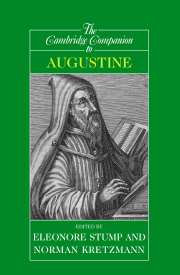Book contents
- Frontmatter
- Introduction
- 1 Augustine
- 2 Faith and reason
- 3 Augustine on evil and original sin
- 4 Predestination, Pelagianism, and foreknowledge
- 5 Biblical interpretation
- 6 The divine nature
- 7 De Trinitate
- 8 Time and creation in Augustine
- 9 Augustine’s theory of soul
- 10 Augustine on free will
- 11 Augustine’s philosophy of memory
- 12 The response to skepticism and the mechanisms of cognition
- 13 Knowledge and illumination
- 14 Augustine’s philosophy of language
- 15 Augustine’s ethics
- 16 Augustine’s political philosophy
- 17 Augustine and medieval philosophy
- 18 Post-medieval Augustinianism
- Bibliography
- Index
9 - Augustine’s theory of soul
Published online by Cambridge University Press: 28 May 2006
- Frontmatter
- Introduction
- 1 Augustine
- 2 Faith and reason
- 3 Augustine on evil and original sin
- 4 Predestination, Pelagianism, and foreknowledge
- 5 Biblical interpretation
- 6 The divine nature
- 7 De Trinitate
- 8 Time and creation in Augustine
- 9 Augustine’s theory of soul
- 10 Augustine on free will
- 11 Augustine’s philosophy of memory
- 12 The response to skepticism and the mechanisms of cognition
- 13 Knowledge and illumination
- 14 Augustine’s philosophy of language
- 15 Augustine’s ethics
- 16 Augustine’s political philosophy
- 17 Augustine and medieval philosophy
- 18 Post-medieval Augustinianism
- Bibliography
- Index
Summary
Knowledge of the soul is central to Augustine's search for wisdom, as is seen in his claim that he desires “to know God and the soul” (Sol. 1.2.7). And when Reason, with whom he converses in the Soliloquia, presses him as to whether he does not desire to know anything more, he answers, “Absolutely nothing. ” Later he expresses the same desire in his prayer, “God ever the same, may I know you, and may I know myself” (Sol. 2.1.1). Though all living beings have souls, Augustine's principal interest is the human or rational soul. He uses the Latin anima for soul in general, while reserving animus or mens for the rational soul. In his earlier writings he defines the human soul in Platonic fashion as “a certain substance partaking in reason and suited to rule the body” (De quant. anim. 13.22) and says that “a human being, as seen by a human being, is a rational soul using a mortal and earthly body” (De moribus ecclesiae catholicae 1.27.52). In later writings he places more emphasis upon the unity of the human being. Though Augustine says that a human being is “a rational soul which has a body,” he also says that “the soul which has a body does not make two persons, but one human being” (In Johannis evangelium tractatus 19.15). A human being can be defined as a single substance with a body and a soul: “If we should define a human being such that a human being is a rational substance consisting of soul and body, there is no doubt that a human being has a soul which is not the body and has a body which is not the soul” (De Trin. 15.7.11).
- Type
- Chapter
- Information
- The Cambridge Companion to Augustine , pp. 116 - 123Publisher: Cambridge University PressPrint publication year: 2001
- 4
- Cited by



